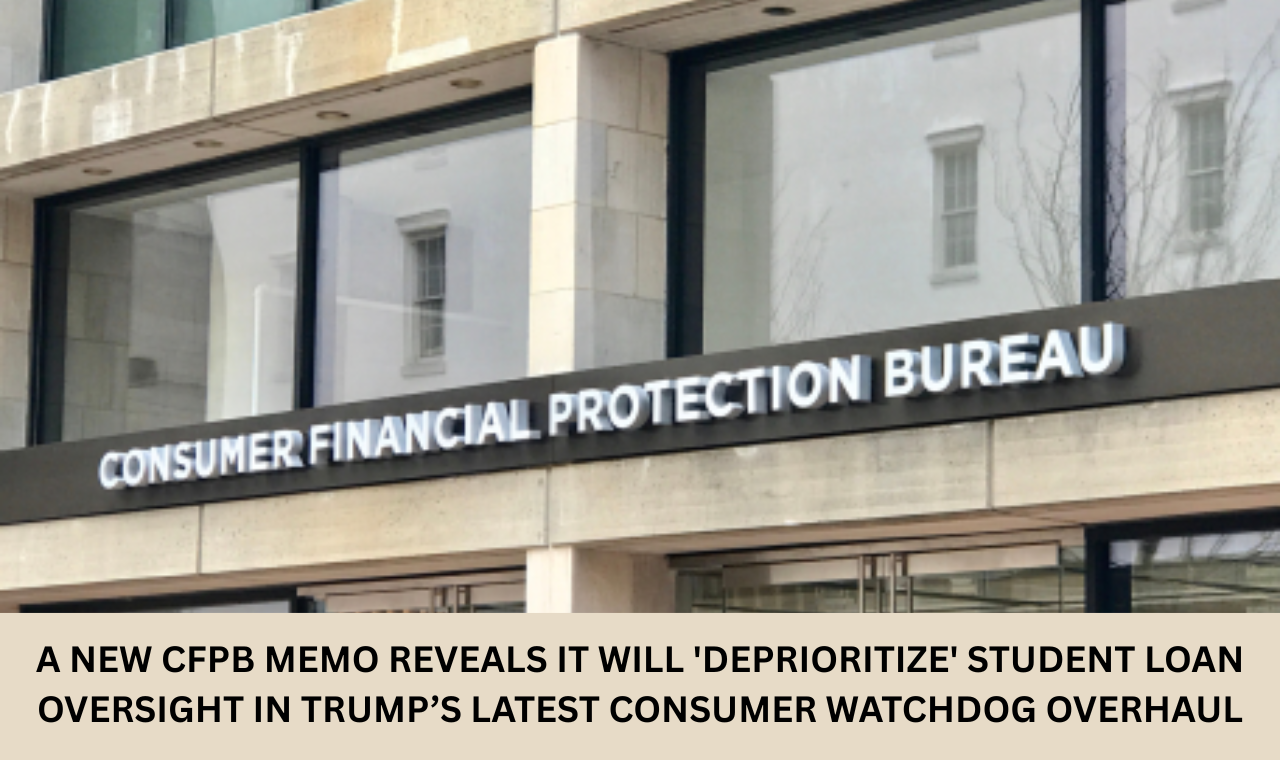In a major policy shift, the Consumer Financial Protection Bureau (CFPB) has announced it will scale back its oversight of the student loan industry, part of a broader restructuring agenda pushed by the Trump administration aimed at transforming the federal consumer watchdog into what officials call a more “targeted” agency.
The change was outlined in an internal memo obtained by multiple media outlets this week. In the document, Mark Paoletta, Chief Legal Officer at the CFPB, directed staff to refocus their efforts on “immediate threats to consumers,” particularly issues affecting service members, veterans, and their families.
This move comes as part of a larger Trump-era effort to overhaul the CFPB — a regulatory agency created in the aftermath of the 2008 financial crisis through the Dodd-Frank Act to protect consumers from abusive financial practices. You can learn more about the CFPB’s original mandate here.
A Departure From the Biden Era
The pivot represents a stark departure from the CFPB’s direction under President Joe Biden, when the agency aggressively pursued enforcement actions against student loan servicers. Under former CFPB Director Rohit Chopra, the bureau was instrumental in holding loan companies accountable, including securing a $100 million settlement with Navient in 2024 over allegations that it steered borrowers into costly long-term forbearance rather than more affordable repayment plans.
The CFPB under Biden also reinstated the role of Student Loan Ombudsman, an internal position designed to assist borrowers with complaints. You can read about this office here.
Critics now warn that abandoning federal oversight of the student loan industry could have wide-reaching consequences, especially as millions of Americans face a precarious repayment environment following the end of pandemic-era protections.
Concerns Amid Rising Defaults
Consumer advocates argue that with the expiration of COVID-related relief measures and confusion surrounding the SAVE Plan and other repayment reforms, now is the worst time to step back from student loan oversight.
“The CFPB is walking away from its job at a time when borrowers need the most protection,” said Mike Pierce, Executive Director of the Student Borrower Protection Center, a non-profit that tracks predatory behavior in the loan servicing industry. “This will only embolden bad actors and increase the likelihood of defaults.”
According to the Federal Reserve, Americans collectively owe over $1.6 trillion in student debt. The U.S. Department of Education continues to manage the federal loan portfolio, but the CFPB has historically played a crucial role in investigating abuses and protecting borrowers from deceptive practices by private loan servicers.

Legal Challenges Mount
In response to the Trump administration’s actions, a federal court has temporarily blocked efforts to dismantle core parts of the CFPB’s regulatory authority. In a ruling last week, a judge issued a preliminary injunction, ordering that the bureau maintain its student loan oversight infrastructure — including the Student Loan Ombudsman — while litigation continues.
The case was brought by a coalition of legal advocacy groups and former CFPB officials, who argue that the administration’s attempt to gut the agency is unlawful and would cause “irreparable harm” to consumers.
As of now, the CFPB remains operational and legally obligated to handle consumer complaints. Borrowers can still submit complaints about financial products and services, including student loans, through the CFPB’s complaint portal here.
A Broader Government Restructuring
This policy shift is not happening in isolation. It follows President Trump’s executive order proposing to eliminate the U.S. Department of Education, a move that has shocked educators and policy experts. The plan would transfer student loan servicing duties to the Small Business Administration (SBA) — an agency traditionally focused on supporting entrepreneurs and small business owners.
Details remain unclear, but experts have raised concerns that such a transfer could result in confusion, delayed servicing, and reduced oversight.
“This is not just a reshuffling of bureaucracies — it’s a fundamental restructuring of how we treat student borrowers in this country,” said Persis Yu, a managing counsel at the National Consumer Law Center. “And it risks creating a crisis in access, clarity, and enforcement.”
The Office of Management and Budget (OMB) has yet to provide a full cost-benefit analysis of the proposal.
What Happens Next?
With legal and political battles underway, the fate of student loan oversight at the federal level remains uncertain. While the CFPB has committed to narrowing its scope, advocacy groups and some lawmakers are urging Congress to step in and reaffirm the agency’s consumer protection mandate.
Meanwhile, the Biden-era reforms, including the SAVE Plan and the Income-Driven Repayment (IDR) Account Adjustment, remain in place. Borrowers are encouraged to stay informed through official channels like StudentAid.gov and to contact their servicers with questions about repayment.
Have a student loan complaint? You can file a formal complaint with the CFPB here or contact the Student Loan Ombudsman here.
Final Thoughts
The decision by the Trump administration to deprioritize student loan oversight at the CFPB raises significant concerns about the future of consumer protections, particularly for the millions of Americans carrying student loan debt. As the legal and political battles continue, it remains to be seen whether lawmakers or other agencies will step in to fill the void left by the CFPB’s shifting priorities. Meanwhile, borrowers must stay vigilant and informed about their rights and available protections, especially in an environment where federal oversight is being reduced. The stakes are high, and the potential consequences could be far-reaching, affecting not only student borrowers but the entire landscape of consumer finance.

Pankaj Kumar is a skilled content writer at OTE News, focusing on breaking news, technology, and socio-political developments. With a background in Mass Communication, he brings a balanced perspective to his articles, ensuring clarity and reliability. Pankaj has a knack for simplifying complex topics for readers.
In his free time, he enjoys photography, traveling, and experimenting with new cuisines. His curiosity and dedication to truthful reporting make him a valuable contributor to OTE News.




